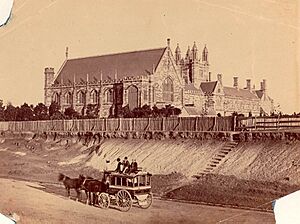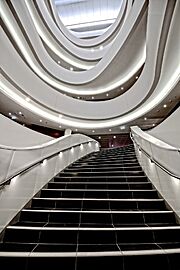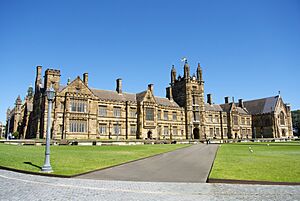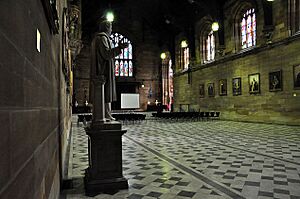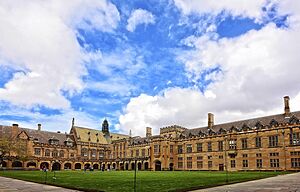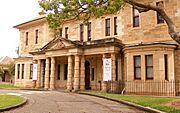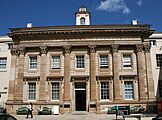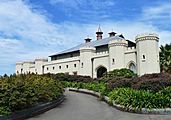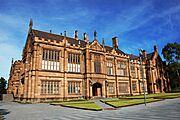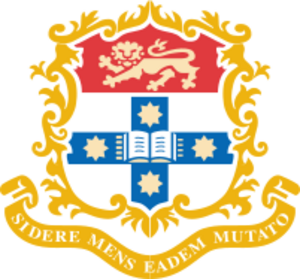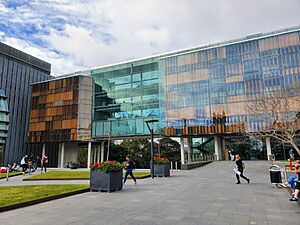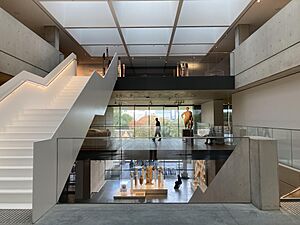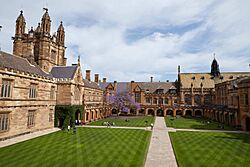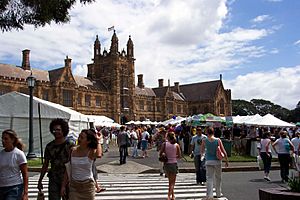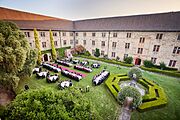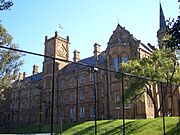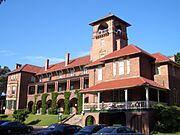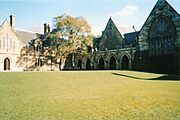University of Sydney facts for kids
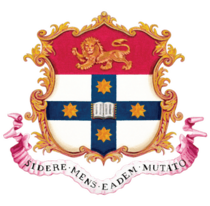
|
|
| Latin: Universitas Sidneiensis | |
| Motto |
Latin: Sidere mens eadem mutato
|
|---|---|
|
Motto in English
|
"The stars change, the mind remains the same" |
| Type | Public research university |
| Established | 1 October 1850 |
| Accreditation | TEQSA |
| Affiliation | Group of Eight (Go8) |
|
Academic affiliations
|
|
| Endowment | A$4.92 billion (2024) |
| Budget | A$3.07 billion (2023) |
| Visitor | Governor of New South Wales (ex officio) |
| Chancellor | David Thodey |
| Vice-Chancellor | Mark Scott |
|
Academic staff
|
3,735 (2023) |
|
Administrative staff
|
5,316 (2023) |
|
Total staff
|
9,051 (2023) |
| Students | 68,421 (2023) |
| Undergraduates | 39,990 (2023) |
| Postgraduates | 24,781 (2023) |
| 3,650 (2023) | |
| Location |
Sydney
,
,
Australia
33°53′15″S 151°11′24″E / 33.88750°S 151.19000°E |
| Campus | Urban, regional and parkland |
| Colours | Ochre Charcoal |
|
Sporting affiliations
|
|
| Mascot | Simba the Lion |
 |
|
The University of Sydney (often called USYD) is a large public research university in Sydney, Australia. It was started in 1850, making it the oldest university in Australia and Oceania. It was one of the first universities in the world to accept students based only on their academic results. It also welcomed women students on the same terms as men. The university has eight main academic areas, called faculties and schools. They offer different types of degrees, from bachelor's to doctoral degrees.
Many important people have been connected to the university. This includes five Nobel Prize winners and two Crafoord Prize winners. Eight Australian prime ministers, including the current one, Anthony Albanese, studied here. Also, two governors-general of Australia and 13 premiers of New South Wales are alumni. The university has also produced many Rhodes Scholars and Gates Scholars. The University of Sydney is part of important groups like the Group of Eight universities in Australia.
Contents
History of Sydney University
Early Years (1850–1950)
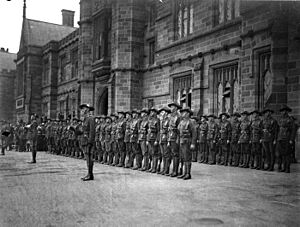
In 1848, William Wentworth and Sir Charles Nicholson suggested creating a university. They wanted to expand the existing Sydney College. Wentworth believed it would help "the child of every class" become important. He thought a public university was vital for a society that wanted to govern itself. He pushed for access based on talent, not on a person's religion or social standing.
The university was officially created on 1 October 1850. This happened when the University of Sydney Act 1850 was passed. Two years later, on 11 October 1852, the university opened. It was Australia's first university. It was also one of the first public, non-religious universities in the British Empire. In 1858, Queen Victoria gave the university a royal charter. This meant its degrees were recognized just like those from universities in the United Kingdom.
The university was one of the first in the world to accept women equally with men. This started in 1881. In 1885, Mary Elizabeth Brown and Isola Florence Thompson were the first women to earn bachelor's degrees. Thompson later became the first woman to get a master's degree in 1887.
A large sum of money, £200,000, was given to the university in 1889. This came from the estate of John Henry Challis. This gift helped create seven new professorships. These were in subjects like anatomy, engineering, history, and law.
In 1924, John Bradfield earned the university's first Doctor of Science in Engineering degree. His work was about electric railways and the Sydney Harbour Bridge. Bradfield later became the main engineer for building the Sydney Harbour Bridge.
Middle Years (1950–2000)
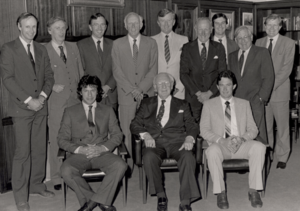
The PhD research degree was first offered in 1947. The first PhD was awarded in 1951 to William H. Wittrick.
A part of the university, the New England University College, became a separate university in 1954. It is now known as the University of New England.
In the late 1960s, there were discussions at the university about new courses. These included topics like Marxism and feminism. The philosophy department even split into two different groups.
Several other colleges and schools joined the university in 1990. These included the Sydney Conservatorium of Music and the Sydney College of the Arts.
Recent History (2000s–Present)
In 2007, the university acquired land from St John's College. This land was used to build the Charles Perkins Centre. It was named after Charles Perkins, the first Indigenous Australian man to graduate from the university.
In 2010, the University of Sydney changed its main logo. It kept the same coat of arms but gave it a more modern look. The original coat of arms from 1857 is still used for special events.
The university received a painting by Pablo Picasso in 2010. The painting, Jeune Fille Endormie, was sold for over $20 million AUD. The money from the sale helped create new research positions at the Charles Perkins Centre.
The university has worked to manage its finances. This included making some changes to staff roles. There were also discussions about how the university was being run.
In 2016, the university started plans to combine some of its degrees. This was to reduce the total number of programs offered. Students and staff have also held protests about global issues.
University Campuses and Buildings
Main Campus Features
The main campus is in the Sydney suburbs of Camperdown and Darlington. It is known for its beautiful old buildings and the main quadrangle. The government gave land to the university in 1855. This land, three kilometers from the city, became the main Camperdown campus.
The architect Edmund Blacket designed the first buildings. The Great Hall was finished in 1858. The main building, with its Neo-Gothic style, was completed in 1862. As the university grew, it bought more land in Darlington. The Camperdown/Darlington campus is where the university's main offices are. It also houses many faculties like Arts, Science, and Engineering. The large Sydney Medical School is also based here.
The main campus is also a hub for student life. The University of Sydney Union (USU) has three buildings. These buildings have places to eat, common rooms, and event spaces. One of the biggest events is Welcome Week. This is a festival at the start of the school year. Clubs and societies set up stalls on the lawns during this week.
The campus has many statues and artworks. These include the Gilgamesh Statue and the Confucius Statue.
In 2015, the university started a big plan to improve its campus. This plan involved new buildings and renovations. The university is always working to update its facilities. For example, a new building for the Sydney Law School was completed. A new building for business students, the "Abercrombie Building," opened in 2016.
In 2018, the main campus and nearby areas were added to the state heritage register. This helps protect their historical importance. In 2021, some health departments moved to a new building on the Camperdown campus.
Other University Locations
- Sydney Dental Hospital: This is located in Surry Hills.
- The Sydney Conservatorium of Music: This music school is in the Sydney CBD. It is near the Sydney Opera House. It became part of the university in the 1990s.
- Camden campus: This campus is in Sydney's southwest. It has lecture halls, research centers, and farms. It is used for bioscience, agriculture, and veterinary science.
- Sydney CBD campus: The University of Sydney Business School has a campus in the heart of Sydney's city center.
The university also uses other places for teaching and research:
- The Sydney Medical School has eight clinical schools at hospitals.
- The Sydney Pharmacy School has its own building with labs.
- One Tree Island is a research station on the Great Barrier Reef. It is used for studying marine life.
- The IA Watson Grains Research Centre is in Narrabri, New South Wales. It is a research station for agriculture.
- The Molonglo Observatory is near Canberra.
- Arthursleigh is a farm estate near Goulburn.
How the University is Run
Faculties and Study Areas
The university has eight main faculties and schools:
- Arts and Social Sciences
- Business School
- Engineering
- Medicine and Health
- Science
- Architecture, Design and Planning
- Conservatorium of Music
- Law School
The largest faculties by student numbers are Arts and Social Sciences, Medicine and Health, Business, Science, and Engineering. These five areas teach almost 88% of all students.
Continuing Education
The Centre for Continuing Education offers courses for adults. These courses help people keep learning throughout their lives. This program started in 1886, making it Australia's longest-running university program of its kind.
University Finances
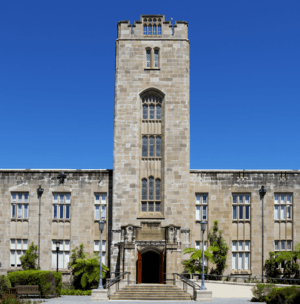
The university has received many important gifts over its history. These gifts help fund various programs. They support professorships, research funds, and scholarships. Many of these are named after the people who donated money. For example, the John Challis Bequest supports chairs in Law and Engineering.
University Symbols
Coat of Arms
The university's Coat of Arms was given by the College of Arms in 1857. It shows a blue cross with an open book and four gold stars. Above this is a red section with a gold lion.
The motto is in Latin: Sidere mens eadem mutato. This means "the stars change, the mind remains the same." This motto suggests that even if things around you change, your mind and knowledge stay strong.
Learning and Research
Libraries and Collections
The University of Sydney Library has 11 different libraries across its campuses. It is the largest academic library in the southern hemisphere. In 2007, it had about 5 million physical books and 300,000 e-books. It is also the only university in Australia that is a state legal deposit library. This means it receives a copy of every printed material published in New South Wales.
The Rare Books Library is part of the Fisher Library. It holds 185,000 rare or valuable books and manuscripts. This includes medieval manuscripts and works by famous scientists like Galileo and Isaac Newton. It also has a large collection of items about Australia.
Museums and Art
The Chau Chak Wing Museum displays the university's collections of art, natural history, and ancient objects. It opened in November 2020. The museum brings together the Nicholson Collection of ancient items, the Macleay Collections of natural history, and the University Art Collection. It is named after Chau Chak Wing, a Chinese-Australian businessman.
Main Collections
- The Nicholson Collection is the largest collection of ancient items in Australia. It was started in 1860. It has ancient artifacts from Egypt, Greece, and Rome.
- The Macleay Collection is the oldest natural history collection in Australia. It started with a collection of insects in the late 1700s. It now includes natural history specimens, cultural artifacts, and old photographs.
- The University Art Collection began in the 1860s. It has over 7,000 pieces of art.
Other Galleries
- Verge Gallery is run by the University of Sydney Union. It shows modern art by new artists.
University Rankings
| University rankings | |
|---|---|
| QS World | =25 |
| ARWU World | 74 |
| US News World | 29 |
| Australian rankings | |
The University of Sydney is often ranked among the top universities in the world. In 2024, it was ranked #47 globally when combining different major rankings.
- In the 2026 Quacquarelli Symonds World University Rankings, it was ranked #25 globally.
- In the 2025 Times Higher Education World University Rankings, it was ranked #61 globally.
- In the 2024 Academic Ranking of World Universities, it was ranked #74 globally.
- In the 2025–2026 U.S. News & World Report Best Global Universities, it was ranked #29 globally.
- In the 2024 CWTS Leiden Ranking, it was ranked #42 globally.
Student Success
The Australian Government surveys how well students do after university. These surveys look at things like student experience and job outcomes.
- In 2023, employers were very happy with graduates from the university. The satisfaction rate was 89.6%.
- In 2023, 80.9% of undergraduate students found full-time jobs. For postgraduate students, this rate was 89%.
- The average starting salary for undergraduates was $70,000 AUD. For postgraduates, it was $96,000 AUD.
- In 2023, undergraduates rated their overall education experience at 71.7%. Postgraduates rated theirs at 70.8%.
Student Life at Sydney University
Student Groups
- Student Representatives: Undergraduate students have a group called the University of Sydney Students' Representative Council (SRC). Postgraduate students have the Sydney University Postgraduate Representative Association (SUPRA). These groups speak for the students.
- University of Sydney Union: The University of Sydney Union (USU) is the oldest and largest student union in Australia. The USU offers many activities and services. These include clubs, events, food services, and places for students to relax.
Students elect representatives to lead the SRC and USU each year.
Charles Perkins Oration and Prize
Since 2000, the university has held the Dr Charles Perkins Oration. This event honors Charlie Perkins. He was the first Aboriginal person to graduate from the university. Important First Nations people give speeches at this event.
The Oration also includes the Charles Perkins Memorial Prize. This prize celebrates the top three Indigenous students at the university. It is given based on their excellent academic results.
Famous People from Sydney University
Notable Alumni
Many people who studied at the University of Sydney have become very famous. They have made big contributions in Australia and around the world.
- Leaders: Eight Australian prime ministers studied here. This is more than any other university. Also, five chief justices of the High Court of Australia and two governors-general are alumni.
- Nobel Prize Winners: The university is linked to five Nobel Prize winners. These include John Cornforth (chemistry) and John Harsanyi (economics).
- Science and Space: The School of Physics has been important in radio astronomy. Alumni include Ruby Payne-Scott, who did early radio astronomy work. Philip K. Chapman, an Apollo 14 Mission Scientist, and Paul Scully-Power, the first Australian-born astronaut in space, also studied here.
- Arts: Famous alumni in the performing arts include opera singer Joan Sutherland and actor John Bell.
- Activists: Important community activists like Charlie Perkins and Germaine Greer are also alumni.
Student Housing
The university has several places for students to live. These include Halls of Residence and residential colleges. The Halls of Residence are managed by the university. They aim to provide affordable housing and a good learning environment.
- The Queen Mary Building
- Abercrombie Student Accommodation
- Regiment Student Accommodation
The university also runs International House.
There are also six residential colleges linked to different religious groups. These colleges are not tied to specific study areas.
- International House
- St John's College
- St Andrew's College
- St Paul's College
- Sancta Sophia College
- Wesley College
- The Women's College
- Mandelbaum House
There is also a student housing cooperative called Stucco.
Gallery of Colleges
|
See also
 In Spanish: Universidad de Sídney para niños
In Spanish: Universidad de Sídney para niños
 | Georgia Louise Harris Brown |
 | Julian Abele |
 | Norma Merrick Sklarek |
 | William Sidney Pittman |


